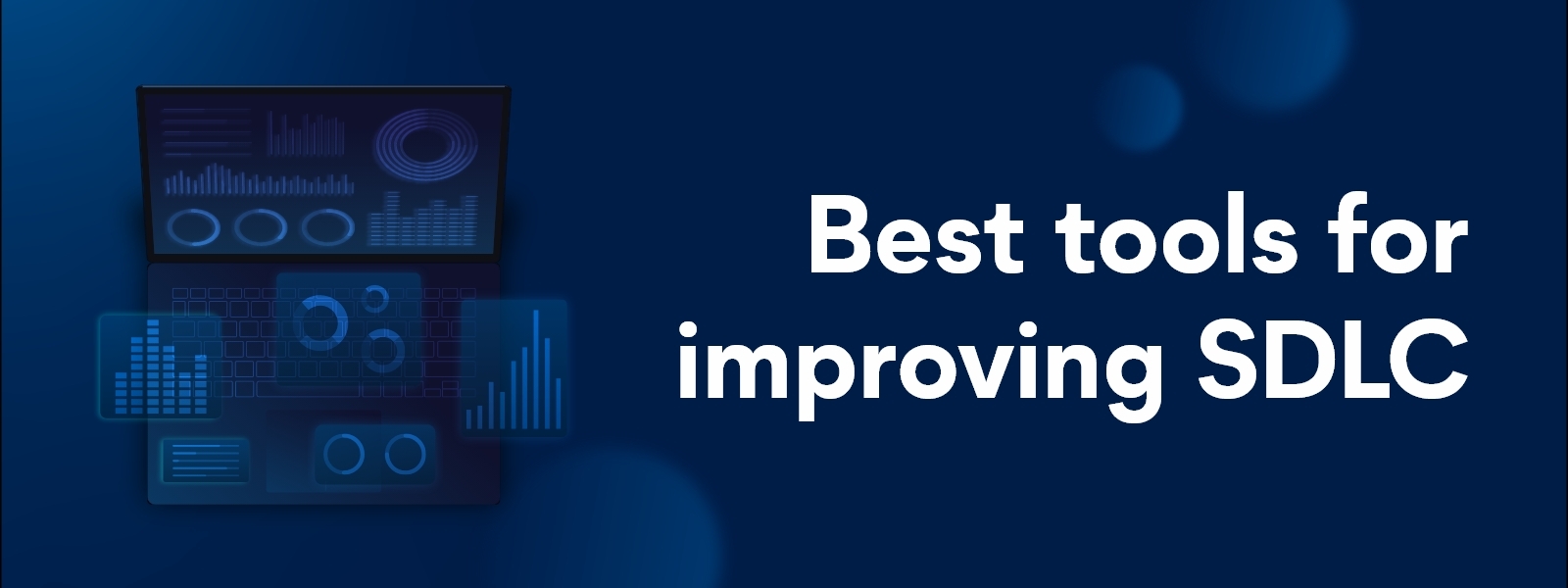SDLC is an iterative process from planning to deployment and everything in between. When applied, it can help in producing high-quality, sustainable low-cost software in the shortest time possible.
But, the process isn’t as simple as it sounds. There are always bug fixes and new features to improvise your product. Hence, you need the right tools to make it simple and quick.
Table of contents
Best tools for improving SDLC
Best tools for improving SDLC
Engineering management tools
Typo is an intelligent engineering management platform. It is used for gaining visibility, removing blockers, and maximizing developer effectiveness. Through SDLC metrics, you can ensure alignment with business goals and prevent developer burnout. This tool can be integrated with the tech stack to deliver real-time insights. Git, Slack, Calenders, and CI/CD to name a few.
Typo key features:
- Cycle time breakdown
- Work log
- Investment distribution
- Goal setting for continuous improvement
- Developer burnout alert
- PR insights
- Developer workflow automation

GIT/VCS
GitHub is a popular git repository hosting service for code sharing. It is a cloud-based tool that allows you to configure, control and maintain code bases with your team. It also offers features such as bug tracking, feature request, and task management. Github’s supported platforms include Windows, Linux, MacOS, Android, and IOS.
GitHub key features:
- Easy project management
- Easy code hosting
- Track and assign tasks
- Navigate files through the repository easily
- Host simple websites for free
Bitbucket is the largest version repository hosting service owned by Atlassian. It provides unlimited private code repositories for Git. Besides this, it also offers issue tracking, continuous delivery, and wikis. The supported platforms for Bitbucket include Linux, AWS, Microsoft, and Azure.
Bitbucket key features:
- Secure platform for code with SOC 2 Type 2 certification
- Pull requests and code reviews
- Support GIT large file storage (LFT)
- External authentication support for GitHub, Facebook, Google, and Twitter.
- Offers advanced search for codes
Issue tracker
Jira is an issue-tracking product that tracks defects and manages bugs and agile projects. It has three main concepts: Project, issue, and workflow. Available on Windows, Linux, Amazon Web Services, and Microsoft Azure, Jira can be integrated with various engineering tools. A few of them include Zephyr, GitHub, and Zendesk.
Jira key features:
- Create and share complex roadmaps
- Relevant information available in form of reports
- Real-time notifications
- Time tracking with color integration
- Ready to use dashboards and reports
Linear is an issue-tracking tool for high-performing teams. It is used for streamlining software projects, tasks, and bug tracking. The majority of repeated work is automated already which makes the SDLC activities faster. It has more than 2200 integrations available such as Slack, Gitlab, and Marker.io. The supported platforms for linear are MacOS intel, MacOS silicon, and Windows.
Linear key features:
- Lightweight and fast
- Real-time sync
- Works in offline mode as well
- Can create multiple teams and reside in a shared workspace
- Highly detailed issue tracking

ClickUp:
ClickUp is a leading issue-tracking and productivity tool. It is highly customizable that lets you streamline issue-tracking and bug-reporting processes. It has powerful integrations with applications such as Gitlab, Figma, and Google Drive. ClickUp is available on Windows and Android.
ClickUp key features:
- Customizable bug-tracking views
- ClickUp docs for creating roadmaps and outline process
- Offers a wide range of templates
- Supporting programming languages including HTML, Python, CMS, PHP, and many more.
- Sync with Google Calendar
Communication platforms
Slack is a popular communication tool for engineering leaders and developers. It provides real-time visibility into project discussions and growth. This tool is available for many platforms such as Web, Windows, MacOS, Android, IOS, and Linux. Slack has an extensive app directory that lets you integrate engineering software and custom apps.
Slack key features:
- Simple and intuitive interface
- Video and voice calls via Huddles
- Can create public and private channels
- Get notifications from Jira, Jenkins, and many more in slack channels directly
- Remove unnecessary friction by bringing engineering leaders and developers to one place

Microsoft Teams streamlines communication and collaboration in a single platform. It assists in keeping up to date with development, testing, and deployment activities. Available for Web, IOS, Android, Windows, and MacOS, MS teams include built-in apps and integrations.
Microsoft Teams key features:
- Ship software remotely within the cloud-hosted environment
- Quick polls option
- Engineering project templates available
- Easy and structured collaboration
- Build 3D objects in an in-built PowerPoint application
Discord
Discord facilitates real-time discussions and communication. It is available on various platforms which include Windows, MacOS, Linux, Android, and IOS. It has an advanced video and voice call feature to collaborate for SDLC activities.
Discord key features:
- Video and voice chat functionality comes with advanced features
- Simple and easy to use
- Direct messages and channels
- Channels accessible according to the hierarchy
Continuous integration and continuous delivery tools (CI/CD)
Jenkins:
Jenkins is one of the popular CI/CD tools for developers. It is a Java-based tool that produces results in minutes and provides real-time testing and reporting. Jenkins is available for MacOS, Windows, and Linux platforms. It also offers an extensive plug-ins library to integrate with other development tools. Github, Gitlab, and Pipeline to name a few.
Jenkins key features:
- As it is Java-based, it can run on all platforms
- A completely free and open-source tool
- Easy and user-friendly interface
- Build schedules based on expressions
- Strong support from large online communities of the Agile team
Azure DevOps by Microsoft is a comprehensive CI/CD platform. It ensures that the entire software development delivery is done in a single place. From automating, building, and testing code, Azure DevOps brings together developers, product managers, and other team members. This tool has cloud-hosted pipelines available for MacOS, Windows, and Linux. Besides this, it has an integration of over 1000 apps built by the Azure community.
Azure DevOps key features:
- A self-hosted CI/CD model
- Clean user interface
- Secure at all times through encryption techniques including SSL/TLS or IPSec VPN tunnels
- Supports manual and exploratory testing
- Adaptability to market demands
AWS Codepipeline:
AWS Codepipeline is an ideal CI/CD tool for AWS users. It helps in automating your build, release, and pipeline CI/CD processes. AWS Codepipeline also offers fast and reliable application and infrastructure updates. With easy steps, you can set up Codepipeline in your AWS account in a few minutes. This tool can also be integrated with third-party servers. It includes GitHub or your custom plugin.
AWS Codepipeline key features:
- Supports code building, testing, and compilation
- Rapid delivery of new features and updates
- Pre-built and custom plug-ins
- Receive notifications for events
- Increase developer output
Code quality tools
SonarQube is a popular static code analysis tool. It is used for continuous code inspection of code security and quality. The quality gate in this tool blocks any code that doesn’t reach a certain quality. It stops the code from going into production. It integrates with various code repositories such as GitHub, Bitbucket, and GitLab. SonarQube’s supported platforms are MacOS, Windows, and Linux.
SonarQube key features:
- Supports on-premise and cloud setup
- Supporting programming languages including Python, C#, and Java
- Generates detailed code reports
- Identify tricky issues
- Identify security vulnerabilities in the code and emphasize them
Codefactor.io is a code analysis and review tool that helps you to get an overview of the code base. It also allows you to get a glance at a whole project, recent commits, and problematic files. The powerful integrations of CodeFactor.io are GitHub and Bitbucket.
CodeFactor.io key features:
- Easy setup
- Offers analytical data
- Create comments directly from the code
- Supports programming languages such as HTML, Java, PHP, and Python.
- Provide real-time actionable feedback for potential quality issues
Test automation tools
Selenium is a powerful tool for web-testing automation. It is implemented by organizations of different industries to support an array of initiatives including DevOps, Agile model, and Continuous delivery. Selenium is one of the best test automation tools that can be automated across various Os. It includes Windows, Mac, and Linux as well as browsers such as Chrome, Firefox, IE, Microsoft Edge, Opera, and Safari.
Selenium key features:
- Executes test in parallel with Selenium grid
- Supports programming languages such as Ruby, Java, Perl, and C#
- Includes various customization options
- Testing on local or remote machines via the Selenium server
- Supports mobile web applications on various platforms like Android, iPhone, and Blackberry
LambdaTest is one of the well-known test automation tools that provides cross-platform compatibility. It can be used with simulated devices on the cloud or locally deployed emulators. This tool can be integrated with a variety of frameworks and software tools. It includes Selenium, Cypress, Playwright, Puppeteer, Taiko, Appium, Espresso and XCUITest.
LambdaTest key features:
- A cloud-based cross-browser testing platform
- Automated reports downloadable in different formats
- Testing web apps in multiple operating systems, including Windows and Mac
- Geolocation web testing across over 27 countries
- Create and run both manual and automatic tests
Cypress is an open source automation tool for front-end developers that operates with a programming language – JavaScript framework. It is one of the popular test automation tools that focuses on end-to-end testing. It is built upon a new architecture, hence, it can directly operate within a browser in the same run-loop as your application.
Cypress key features:
- Installation of this tool is simple
- Test runs in any modern browser
- Can easily get the test snapshots from the command log
- Supported programming language is JavaScript
- Connects to Cypress Cloud for test performance and optimization
It is one of the automated code review tools for static analysis. Supporting more than 40+ programming languages, Codacy also integrates with various popular tools and CI/CD workflows.
Codacy key features:
- Gives a clear picture of how projects are doing and how their quality is changing over time
- Adaptable to your code review process
- Provides code coverage
- Helps in knowing the amount of technical debt
- Can identify duplication and poor code metric areas
One of the code review tools that is built on a SaaS model. It helps in analyzing code from a security standpoint.
Key features:
- Gives test coverage by using binary code/bytecode
- Automates different workflows with integrated and streamlined testing in SDLC
- Offers set of two code review tools – Static analysis and software composition analysis
- Provides mitigation management
- Integrated into existing debugging systems
AI pair programmer
GitHub Co-pilot is an AI pair programmer that uses open AI codex for writing code quickly. The programmer is trained in natural language and publicly available source code that makes it suitable for programming and human languages. The aim is to speed up the development process and increase developers’ productivity. It draws context from the code and suggests whole lines or complete functions. GitHub works the most efficiently with few programming languages. These include Typescript, Javascript, Ruby, Python, GO, C#, and C++. It can be integrated with popular editors. It includes Neovim, JetBrains IDEs, Visual Studio, and Visual Studio Code. However, you need to install visual studio code for using GitHub on this platform.
GitHub Co-pilot key features:
- Create predictive lines of code from comments and existing patterns in the code
- Suitable for programmers and human languages
- The more context you offer, the more accurate and usable it is
- Easy to use
- Good at writing boilerplate code
- Improved code navigation
- Create dictionaries of lookup data

Conclusion
These tools can assist you well while you work on SDLC activities.
In this article, we have highlighted some of the well-known tools for your team. You can research more about them to know what fits best for your team.





